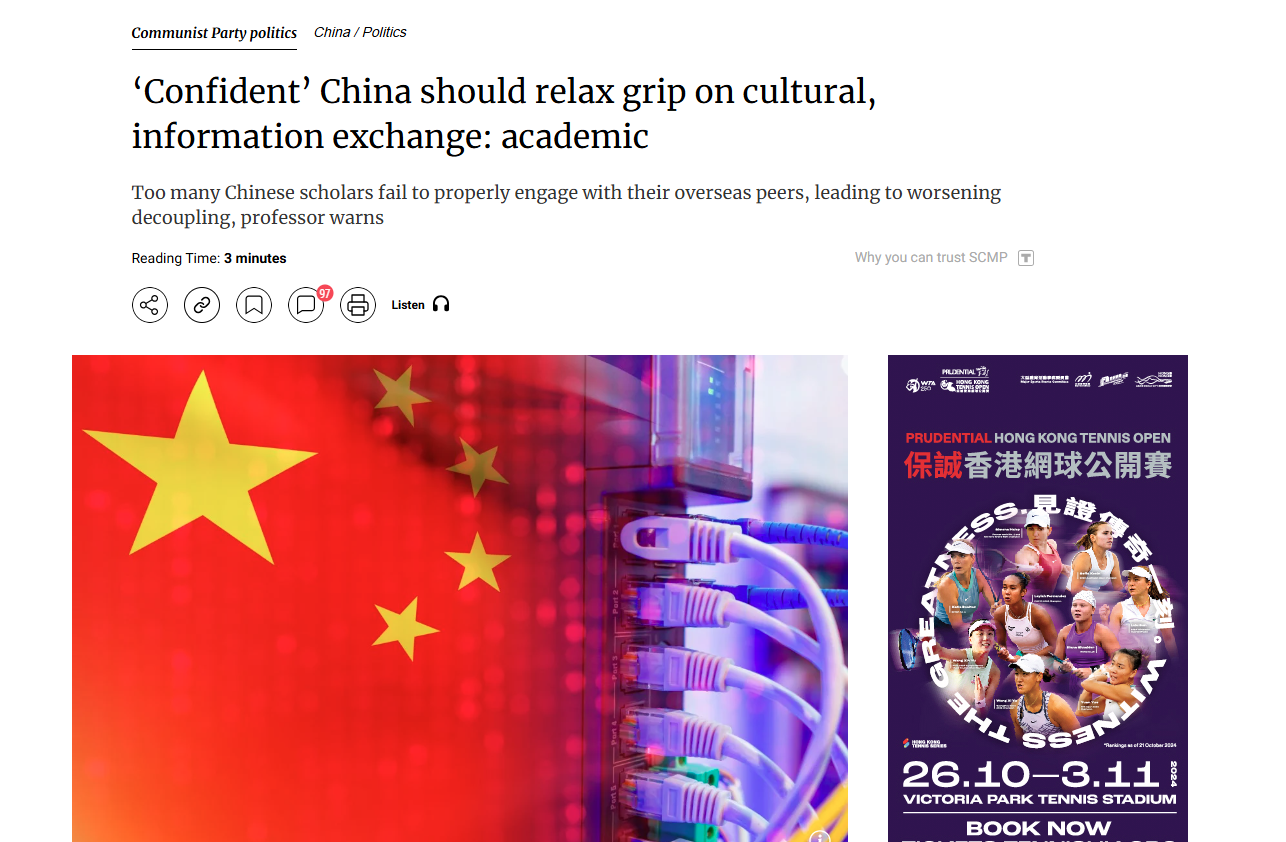LATEST INSIGHTS
Your Present Location: LATEST INSIGHTSWang Wen:‘Confident’ China should relax grip on cultural, information exchange: academic
Source: South China Morning Post Published: 2024-10-20

By Jane Cai
China should cut red tape around international cultural exchanges and relax its internet controls to prevent the worsening of its information “decoupling” from the world, a leading academic said.
Wang Wen, dean and professor of the Chongyang Institute for Financial Studies at Renmin University, noted that China had become a target for criticism by Western countries as Beijing pursued a bigger say in the global narrative.
“China has solved the problems of hunger and poverty. Now it’s time to address the problem of being scolded,” he wrote in last week’s issue of Think Tank: Theory & Practice, the bimonthly journal published by the Chinese Academy of Sciences and Nanjing University.
According to Wang, he has witnessed many awkward moments when Chinese scholars at overseas symposiums were asked “sensitive questions” on topics ranging from China’s leadership moves to human rights concerns in Xinjiang or Tibet.
Wang said he had attended events in more than 20 countries since China removed its pandemic curbs in 2022, and seen many scholars fail to properly address queries from overseas audiences.
Other subjects that Chinese academics find difficult to handle at these events include China’s battle against Covid-19, social governance, and cross-strait tensions with Taiwan, according to the article.
Wang suggested that these difficulties could arise because of insufficient language skills, limited knowledge of the matters raised, or that the speaker may “have some concerns”, which he did not specify.
Many Chinese scholars chose to resort to the “official narrative” to explain what was happening in the country to foreign peers, instead of providing their own perspectives as public intellectuals, he wrote.
“If American scholars only repeated the White House’s policy advocacy or remarks of the US president, [it would be impossible for] the US to take the leading position in the world’s narrative system for such a long time.”
China has tightened speech controls as it prioritises national security amid the rivalry with the US and its allies, creating a tense environment for people to speak freely especially on controversial and politically sensitive issues.
Meanwhile, at the third plenum – a key Communist Party conclave which concluded in July – the party’s elites agreed to “establish a more effective international communication system”, as well as expand cultural exchanges and cooperation to benefit China’s development.
In his article, Wang noted that Chinese academics went through lengthy scrutiny for approval from their employers to be interviewed by overseas media, go abroad for seminars, or receive visiting foreign peers.
The process “seriously hampers exchanges of views and opinions”, he wrote. “China should thoroughly simplify the approval procedures, get rid of the formalism and stop overstretching the concept of national security to facilitate international communication.”
Wang also turned his attention to the Great Firewall – China’s sophisticated internet censorship system – which he said had “semi-decoupled” Chinese academia from the world and led to slow progress in efforts to catch up in technology and social sciences.
China’s internet controls made it hard for researchers to use foreign search engines and access overseas websites. Instead, most had to rely on domestic search engines which were at least a decade behind more advanced systems, he wrote.
According to Wang, information decoupling threatens to be even more devastating for China in the age of artificial intelligence.
He argued that if Chinese content could not flow freely and merge into the databases used to feed AI models, Beijing’s narrative would be at a disadvantage in international communications.
Wang called for the gradual removal – region by region – of the Great Firewall, to stop the developing trend of “parallel worlds” from worsening as China gradually became more disconnected from the outside world.
He also suggested that China should expand its visa-free policy to visitors from more countries to improve people-to-people exchanges.
At present, foreign nationals from 54 countries – including the US, Canada, and Britain – are eligible for 72/144-hour visa-free entry if they have a valid onwards ticket to another country. There are also exemptions for cruise ship passengers.
China’s “strict disciplines, complicated procedures and prevalent formalism” were unnecessarily depressing international exchanges as well as other aspects of people’s lives, according to the article.
Wang said that during his visits to cities such as Paris, Berlin and Istanbul he had enjoyed the relaxed lifestyle, chatting with friends and reading newspapers over coffee. China should be similarly confident and loosen controls over cultural exchanges, he added.
In Wang’s own experience, he wrote that he usually enjoyed sharing information and taking part in the heated debates and brainstorming of overseas seminars. The talks were “straightforward”, he said. “No empty talks.”























































































 京公网安备 11010802037854号
京公网安备 11010802037854号





